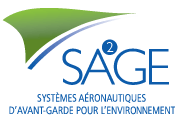About the project
Born from the Québec government's desire to maintain the province's competitive position in aeronautics and to pursue efforts to reduce greenhouse gas emissions, the Greener Aircraft project was launched in 2010. Commonly called SA²GE for ‘Smart Affordable Green Efficient’, the project aimed at the collaborative development of innovative and more environmentally friendly technologies. SA²GE-1 ran from 2010 to 2015. Following the success of Phase 1, a Phase 2 was carried out between 2016 and 2020, followed by phase 3 from 2018 to 2023.
In the spring of 2021, another major developmental project was announced to support the economic recovery of the sector after the COVID-19 pandemic which hit the aeronautics industry hard. The collaborative projects of the aircraft of tomorrow (LPCAD) enable Quebec companies to collaborate on mutually independent projects. All these projects target innovation and mobilization objectives. LPCAD-1 ran from 2021 to 2022, and LPCAD-2 from 2022 to 2024.
Following a call for projects launched in the summer of 2022 by the Quebec government to support the development of technologies linked to tomorrow's transportation, three mobilizing projects have been selected. Phase 1 includes AQUAREL-3, CADAQ-100 and SCAF. These projects aim to develop new technologies for tomorrow's aircraft and sustainable mobility in the Quebec aerospace sector.
Supporting innovation
Through major developmental projects, the Québec government provides financial support to private companies so they may combine their efforts to carry out development projects for an innovative product, process, or service, by involving universities, public research centers and SMEs.
Focus on development activities
SA²GE, LPCAD and TDD, major developmental project are administered by a non-profit organization, The Coalition for Greener Aircraft, more commonly known by its common name SA²GE, which is responsible for the accountability and progress of the work in accordance with the respective grant agreements and other agreements governing the major developmental project. This organization is under the responsibility of a Board of Directors that are elected every two years. This governance structure ensures sound and efficient project management, while facilitating development activities to achieve the desired impact.
Meeting several times a year, the Board of Directors is composed mainly of industrial partners and other member organizations such as Aéro Montreal (the Québec aerospace cluster), the Consortium for research and innovation in aerospace of Quebec (CRIAQ) and Air Canada (representing the target customers).
